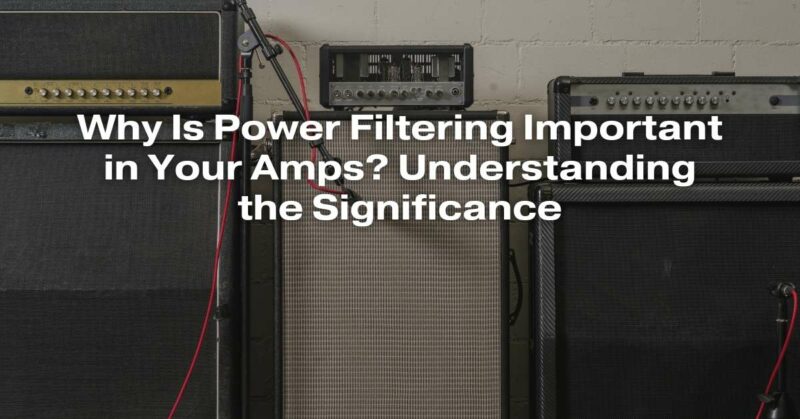When it comes to high-quality audio amplifiers, there’s more to consider than just their wattage or the number of channels they have. An often overlooked but crucial aspect of amplifier performance is power filtering. Power filtering plays a significant role in ensuring that your audio signal remains clean, free from noise, and reproduces sound accurately. In this article, we will delve into why power filtering is important in your amplifiers and why you should pay attention to it when choosing or designing audio systems.
What is Power Filtering?
Power filtering is the process of removing unwanted noise and interference from the electrical power supply before it reaches the amplifier’s internal components. This noise can originate from various sources, including electromagnetic interference (EMI), radio frequency interference (RFI), voltage spikes, and other electrical disturbances. Without adequate power filtering, these disturbances can find their way into the audio signal path, degrading the sound quality and potentially damaging the amplifier’s components over time.
The Significance of Power Filtering
- Noise Reduction:
The most immediate benefit of power filtering is the reduction of noise in the audio signal. Any electrical noise that enters the amplifier can manifest as hums, buzzes, clicks, or static in the output. These unwanted sounds can significantly diminish the listening experience and detract from the overall quality of your audio system. Power filtering helps eliminate or greatly reduce such noise, allowing the amplifier to deliver cleaner and more transparent audio.
- Improved Signal Integrity:
A well-filtered power supply ensures that the amplifier receives a steady and clean voltage, which is essential for accurate audio reproduction. Fluctuations in the power supply voltage can lead to signal distortion, clipping, and other audio artifacts. By filtering out voltage spikes and dips, power filtering helps maintain consistent signal integrity, ensuring that the amplifier faithfully reproduces the input signal.
- Protection from Surges and Spikes:
Power filtering also acts as a safeguard against electrical surges and spikes that can occur due to lightning strikes, power grid fluctuations, or equipment malfunctions. These voltage transients can be destructive to electronic components, including the amplifier’s sensitive circuitry. Power filters equipped with surge protection capabilities can absorb and divert such surges, preventing damage and extending the lifespan of your amplifier.
- Prolonged Component Lifespan:
Consistent exposure to electrical noise and interference can cause premature wear and tear on the amplifier’s internal components, such as capacitors, transistors, and integrated circuits. Over time, this can lead to a decrease in performance and, ultimately, component failure. Adequate power filtering helps protect these components, prolonging the lifespan of your amplifier and reducing the need for costly repairs or replacements.
- Enhanced Audio Quality:
Perhaps the most crucial aspect of power filtering is its positive impact on audio quality. A clean and stable power supply enables the amplifier to operate at its full potential, delivering clear, detailed, and distortion-free sound. Audiophiles and professionals alike appreciate the improved audio quality that results from effective power filtering, making it an essential consideration for anyone serious about their audio setup.
Choosing the Right Power Filter
When selecting an amplifier or power filter, it’s essential to consider your specific needs and budget. High-end audio amplifiers often come equipped with sophisticated power filtering systems. However, standalone power filters are also available and can be added to existing audio systems.
Here are some factors to consider when choosing a power filter:
- Filtering Capacity: Ensure that the power filter can handle the electrical load of your amplifier and other connected equipment.
- Surge Protection: Look for models that provide surge protection to safeguard against voltage spikes.
- Noise Reduction: Check the power filter’s noise reduction capabilities, measured in decibels (dB). A higher dB rating indicates better noise reduction.
- Build Quality: Opt for power filters constructed with high-quality components to ensure durability and longevity.
- Budget: Power filters come in various price ranges, so choose one that fits your budget while meeting your performance requirements.
Conclusion
Power filtering is a critical but often underestimated aspect of audio amplifiers. Its role in reducing noise, ensuring signal integrity, and protecting your equipment cannot be overstated. By investing in a quality power filter or selecting amplifiers with effective built-in filtering, you can enjoy cleaner audio, prolong the lifespan of your equipment, and ultimately enhance your overall listening experience. Don’t overlook the importance of power filtering when designing or upgrading your audio system; it’s an investment that pays off in terms of both audio quality and equipment longevity.


